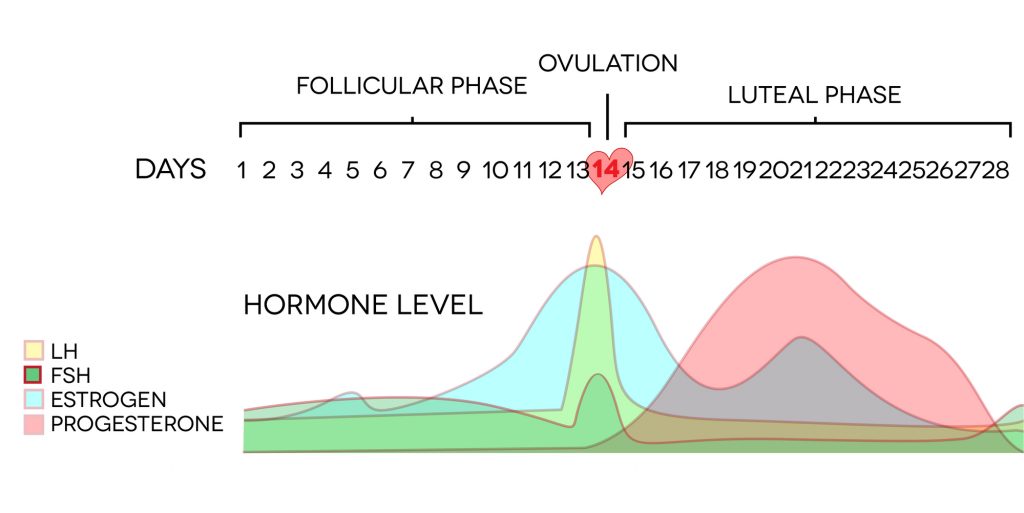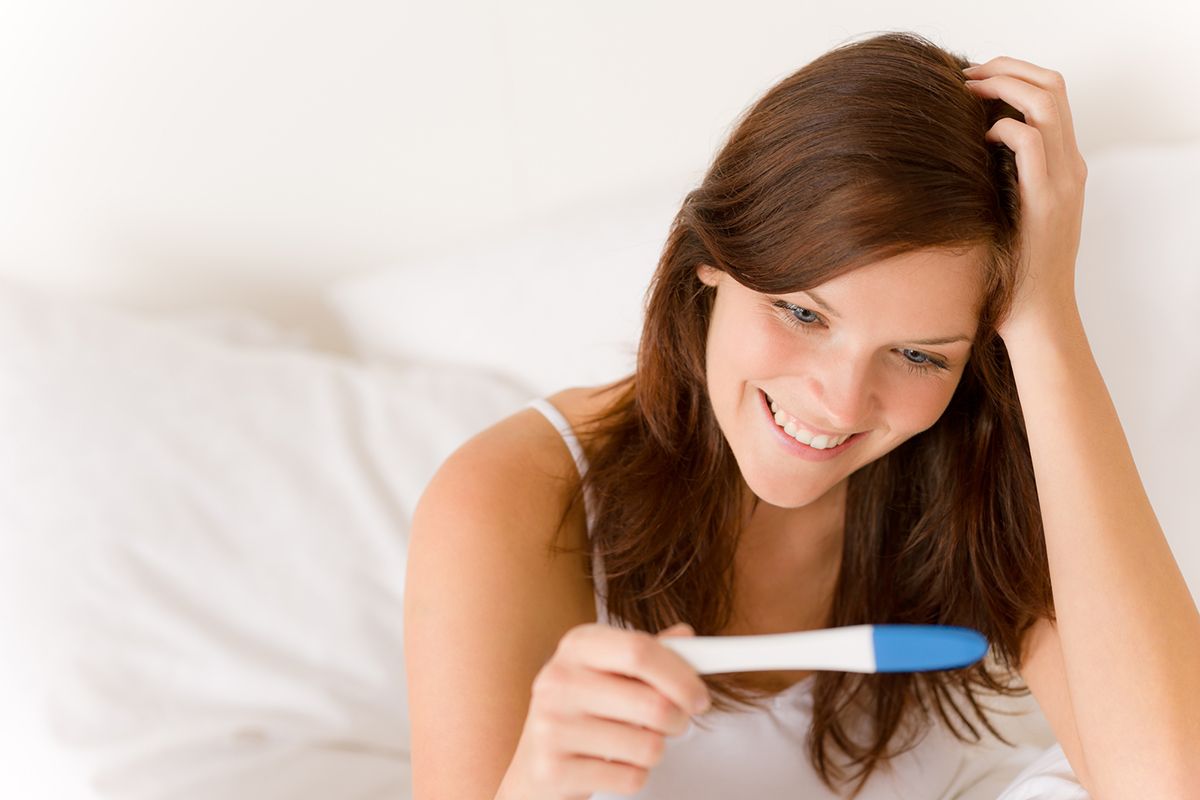This is the first blog in a series explaining ways to boost your fertility to get pregnant. We are going to start with regulating your menstrual cycle, and optimising ovulation and your fertile window. Blog 2 covers testing fertility hormones and blog 3 focuses on supplements that support fertility.
I specialise in Female Health and Fertility and for years have worked successfully with many women just like you. I frequently see the same things happening, and I now know how to identify and support them so you can conceive and have a healthy pregnancy. With a little planning, making some investigations and, importantly, changes this is the first step to boosting your fertility.
All too often I see women so focussed on conceiving, they lose sight of the bigger picture. Conception and getting that positive line on a test is your main goal, but remember – this is only the start. You will be on a journey for 9 months after then to grow, nourish and support your unborn baby before that special time when you get to meet and hold your baby in your arms.
What is a Regular and Optimal menstrual cycle?
It is difficult to regulate your cycle when you don’t know what you are aiming to do. Knowing what an optimal cycle is means you can reflect on your current cycle and identify some tell-tale signs that your hormones may be out of sync and need optimising.
Below is what is considered to be an optimal, menstrual cycle. Just as your health is individual, so is your menstrual cycle and your body’s hormonal rhythm. I view your period as a monthly health download that indicates both hormonal and also general health status. Just keep in mind that because certain period symptoms are considered common, this does not mean they are normal. Rather than comparing your cycle to a friends, or something you’ve heard about, focus instead working toward experiencing a cycle similar to the one below.
I will want to know how your experience compares to this description before I dig a little deeper into hormone and fertility testing and recommending fertility supplements:
- You experience signs of 4 distinct phases in your menstrual cycle – Menstruation, Follicular, Ovulation and Luteal
- There are regularly 26-31 days between day 1 or your last period and day 1 of your next period
- Bleeding lasts for around 4 days with minimal pain, the flow varies from bright red to dark claret, and there are minimal symptoms of PMT or emotional flux
- None or minimal blood clots appear in the flow
- No blood spotting before or after your period and there is a definite start and end to your period
- Ovulation signs including a rise in basel temperature, over 48 hours of fertile discharge and awareness of the position of your cervix changing around ovulation
You may already be charting your BBT, using fertility apps and ovulation strips that predict when you are going to ovulate. You might also already know your hormone levels are out of sync as you have a diagnosed condition, or suspect things are not right because your periods are troublesome and causing you bother.
In order to optimise your hormones, you need to lower your stress levels and you need to allow your body to heal and re-balance. Here is how you are going to do it.
Start by doing less, not more…
Rather than searching for more things that help you get pregnant, now it is time to do less. How annoying is it when people tell you Just stop trying, and things will happen for you…? Please understand this is not what I am suggesting.
What I am suggesting is you need to stop and review all the things in your “if I do this, I will get pregnant plan”. You are going to keep doing the things that serve you well, and let go of things that don’t. So, I want you to start thinking “what can I stop doing to free up space and time for my baby to come into my life?”
Life is busy and it can be really stressful at times. We are often on the go from first thing in the morning until we crash into bed at night. It often feels like we haven’t had a minute to ourselves all day, and we just want to zone out and switch off. What this can also mean is we stay up late to watch TV or spend too much time scrolling through socials and chat rooms searching baby stories, pregnancy tips and fertility hacks. This can leave you feeling really flat and add to existing worries and frustrations. Then you toss and turn in bed, and when the alarm goes off you are tired and struggle to get up.
Your body chooses survival over reproduction
Cortisol is the hormone released when you experience stress. This can be really a good thing, especially if you need energising and motivation to get things done. However, your brain doesn’t differentiate between different type of stress. Recovery from a tough gym workout, or from injury or illness, puts stress on the body. But so do emotional and mental stressors like meeting tight work deadlines, the car breaking down and disagreements with family and friends.
Constant stress becomes chronic and changes from the good type of stress to the unhelpful kind: you feel this kind of stress first thing in the morning, and last thing at night. Unhelpful stress keeps you awake, causes anxiety and messes with your digestion. All too often you feel tired but wired. When Cortisol levels go up but, importantly, don’t come back down again, this causes havoc with many body systems, in particular your hormones.
Your nervous system stays stuck in a sympathetic state: the fight-flight mode that keeps your body primed and on high alert. The chemical messaging from your Hypothalamus and Pituitary glands tell your body to stay in survival mode, and now is not the time to relax, rest or reproduce. Chronic stress and feelings of overwhelm send messages to your brain that, in turn, stop reproductive hormones being made and released. These messages tell your body just now is not the right time to grow a baby.
Balance those hormones

Follicular phase, Ovulation, and Luteal phase.
Important hormones needed for ovulation include Oestrogen, FSH (Follicle Stimulating Hormone) and LH (Luteinising Hormone), and the disrupted messaging from the Pituitary mean they become imbalanced during each of the 4 phases of your menstrual cycle. Even after ovulation, Progesterone required for successful implantation and maintaining a healthy pregnancy, can often be too low and out of whack. Signs of low Progesterone can include irregular cycles, anxiety, PMS symptoms (like irritability, sore breasts and water retention), low libido, low fertility and infertility.
Aside from hormones imbalance, raised Cortisol dysregulates blood sugar balance which can lead to insulin resistance, a common symptom experienced with PCOS. Raised Cortisol also sends messages to your cells telling them where to lay down fat deposits in adipose tissue. These fatty deposits begin to work like an endocrine gland and release more hormones which adds further to your hormone imbalance and fertility problems.
I see women crash dieting and trying to lose weight quickly and change their body shape, while at the same time actively trying to get pregnant! Please don’t do this. Just now is a time to nourish your body and energy rather than restricting nutrients. Although it is well evidenced that, if you are overweight, losing just 10% or your body weight can support ovulation and increase pregnancy rates, this needs to be done in a controlled way, and the best results are achieved working with a nutritionist who is trained to help you lose weight and lose those extra inches, but ensure you stay nourished with the key nutrients required during pregnancy.
Get better quality sleep and more of it

Now is the time to slow everything down, de-stress and rest your body. You need to get better quality sleep and more of it. As you sleep, your body heals and repairs. During sleep blood sugar levels rebalance, and digestive function improves as brush border activity increases and the bacteria in your gut microbiome become more active and work hard to regulate digestive function. During sleep your brain gets the chance to make important neuro-chemicals that govern your mood and emotions.
Sleep also regulates the hormone Melatonin, which has been found to directly promote egg quality and endometrial health. With better quality sleep, you will optimise the Hypothalamic – Pituitary axis with the Ovaries, Adrenals and Thyroid gland. Start to honour your body, and prioritise making time for more sleep.
Now is also the time to ban all IT from your bedroom – including phones used as alarm clocks. You’ll stop watching films and TV in bed and instead create a bedtime routine. Aim to go to bed 1 hour earlier at night, if possible before 10pm. You also want to establish a regular wake up time; get up at least 30 minutes before you need, to allow yourself to wake up properly. On waking think through your day ahead, what you have on and what needs to get done. What are you going to have for lunch and dinner? Make a plan for the day and set aside some time just for you to focus on … you.
This next step on your fertility journey is to do less, not more. Prioritise the things that are going to help you get pregnant. When you are told to de-stress and get more sleep, now you understand the reasons why this is going to regulate your cycle and optimise your ovulation.
Key Take Aways
- Doing less is NOT the same as “just stop trying”, you are still very much trying to get pregnant – just prioritising what your body needs
- Make a list of the things that relax you the most and allow you to swich off – take time out of a busy schedule daily to unwind. Plan at LEAST 10 minutes in the morning and evening to relax and unwind.
- Get more sleep before 10pm and establish regular wake up times. Your body will soon adjust to a new sleep pattern. Make sure your bedroom is uncluttered, cool and dark to support good quality sleep and an optimal circadian rhythm
In my next blog you will learn about important hormones tests, when in your menstrual cycle to test and the difference between clinical and optimal test results.
My FREE guide 16 Ways to Boost your Fertility Naturally to get Pregnant covers lots of other ways to boost your fertility
If you have any questions about any information in this blog, book a free call. I am happy to run through the information sources and where you can find out more.

